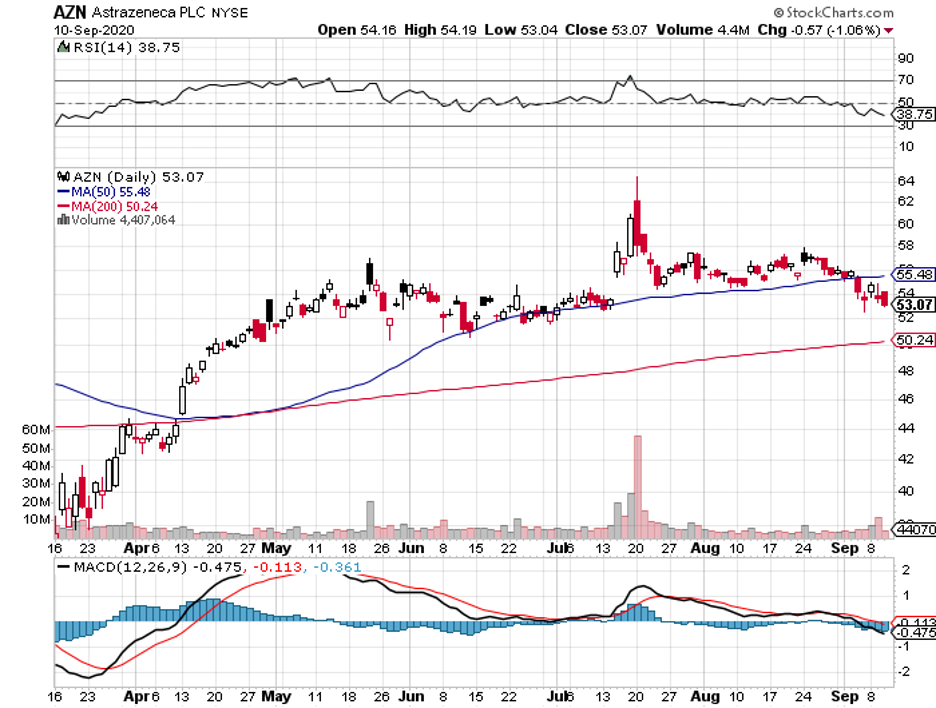AstraZeneca’s Bump in the Road
Moderna (MRNA) was the first company to test its COVID-19 vaccine candidate on humans. However, AstraZeneca (AZN) and its partner Oxford University have been setting out the most aggressive timelines.
In fact, AstraZeneca sealed deals with the promise of delivering vaccine results as early as September.
The possibility of that happening, already precariously hanging by a thread, was completely eliminated earlier this month when the company halted its COVID-19 vaccine program after a subject showed severe adverse reactions.
Needless to say, news of AstraZeneca’s suspension of its late-stage 30,000-patient trial rattled the markets.
However, it looks like investors are simply shaking off the panic as other COVID-19 vaccine stocks continue to gain momentum.
In fact, even AstraZeneca only suffered a 2% slide following the announcement.
Shares of its COVID-19 rivals Pfizer (PFE), Merck (MRK), Johnson & Johnson (JNJ) went up 1% each, while GlaxoSmithKline (GSK) and Sanofi (SNY) rose 2%.
Bigger jumps were seen in smaller biotechnology companies with Moderna and CureVac (CVAC) being 4% higher and Novavax (NVAX), Inovio (INO), and BioNTech (BNTX) climbing 6%.
Still, a lot is riding on AstraZeneca’s vaccine candidate. The company has secured more contracts compared to its rivals.
To date, AstraZeneca has disclosed deals to supply roughly 3 billion doses to different nations including the US, Europe, Australia, Japan, Brazil, Latin America, and even China.
Its leading competitors, Moderna and Pfizer, have only managed to commit a small fraction of AstraZeneca’s supply.
Although AstraZeneca’s decision would cause some delay, experts assure the public that this is a normal occurrence in the vaccine development process.
It is actually a good sign especially given the fast-tracked timelines for the COVID-19 programs.
This voluntary pause from AstraZeneca means that the standards for vaccine development are still stringently followed by the developers despite the tight deadlines and competition.
A third-party safety board was already assigned to review AstraZeneca’s case, with the company expecting results in the next weeks.
So, what happens next?
There are few possible outcomes of this scenario. The ideal result would be for the board to find that the adverse effect has no connection to AstraZeneca’s vaccine candidate.
If this is the case, then the company can restart trials as early as next week. Although it obviously suffered a delay, AstraZeneca says it is still on track and can submit efficacy data before 2020 ends.
If everything else falls into place and from a manufacturing standpoint, AstraZeneca can still deliver a vaccine by the end of the year or early 2021.
If the adverse effect is caused by the vaccine though, then it could spell trouble not only for AstraZeneca but also for some of its rivals using the same technology.
The company utilized a neutralized virus for delivery, which is the same method used by other developers like Johnson & Johnson.
In comparison, Moderna and Pfizer’s vaccine candidates used a new technique involving messenger-RNA. This method stimulates a person’s body to produce a protein, which can help build immunity against the coronavirus.
The worst-case scenario is that if the problem turns out to be an immune reaction to the coronavirus fragments.
This would set back all the COVID-19 vaccine developers because it is the common element among them.
Although the COVID-19 vaccine candidate is a high-value product, AstraZeneca remains poised to prosper no matter what happens as a result of the pandemic or even the overall financial market.
The company is consistently generating strong revenue growth. In particular, its cancer lineup of non-small cell lung cancer treatments Tagriss and Imfinzi, and ovarian cancer therapy Lynparza have been showing remarkable momentum amid the crisis.
However, it is AstraZeneca’s pipeline that makes this stock impressive.
So far, the company has 166 programs that are under clinical development. Of those, 24 have already reached late-stage trials.
What’s even more exciting is that 9 of these late-stage studies are for new drugs. Meanwhile, the remaining 15 are additional approvals for expanded indications of existing products.
AstraZeneca offers one of the most promising product portfolios and clinical pipelines in the healthcare and biotechnology industry. It also provides impressive shareholder reward programs.
Most importantly, this single COVID-19 vaccine candidate is definitely not a make-or-break type of development for the company – not by a very long shot.
Therefore, bargain hunters may want to capitalize on AstraZeneca’s shares on any weakness resulting from this trial suspension.

